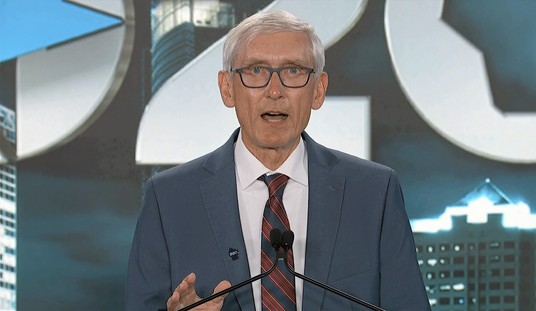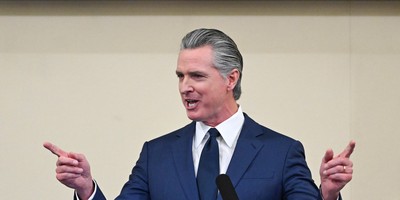The Middle East’s sliver of the globe is, for good reason, known as a rough neighborhood. Empires have risen and fallen there throughout history and, in more modern times, the world’s superpowers have found themselves mired in seemingly endless conflicts that end in embarrassing departures.
President Trump chose to make a swing through this neighborhood the first big foreign trip of his second term. He picked the Persian Gulf as his target — right across the water from Iran — with stops in Saudi Arabia, Qatar, and the United Arab Emirates. In doing so, Trump reminded the world of some of his first term’s biggest foreign policy successes.
Not that the Biden administration could bring themselves to utter the title, but Trump’s historic and Peace Prize-deserving Abraham Accords not only succeeded but also held together after October 7 and through the resulting war. Trump also turned ISIS into was-was, launched a maximum pressure campaign against Iran that forced its terror proxies into panhandling for resources elsewhere, and turned Quds Force commander Soleimani into a smoldering pothole. It was still the Middle East, but Trump brought a roiling mess to a simmer for four years.
This time, Trump is looking to restore the relative order of his first term and expand on his prior Middle East efforts. Rather than previous American attempts at nation building, he set out his framework to offer the Middle East new opportunities at progress while punishing those who continue sowing chaos.
In Riyadh, Trump’s address was perhaps one of the best he’s ever given. It was inspiring for its call to a sort of self-determination for Saudi Arabia and other countries in the region, but remained strongly clear-eyed about having a “no mercy” policy for anyone who threatens the United States or its interests.
Recommended
Unlike Biden, Trump knows and publicly boasts about the greatness of America, and sells economic ties with the United States as an aspirational goal for any country. He literally wrote the book on dealmaking, and no president in recent memory — even in two terms — accomplished what Trump did in just his first term in the Middle East. This week’s investments showed he’s not slowing down.
This is part of what he was elected last November to do, after all, in addition to fixing a laundry list of other national ailments. Need we remember where we were just five short months ago after four years of Biden’s weakness, global chaos, and new wars?
The Afghanistan debacle, Russia’s invasion of Ukraine, and failing to deter China’s hostility were just a few lowlights of Biden’s foreign policy.
Not that these embarrassing failures stopped Biden National Security Advisor Jake Sullivan — you know, the Hillary Clinton fanboy and key pusher of the Russia Collusion Hoax — from penning a ludicrous piece for The Atlantic. In it, he stated the Middle East was “quieter” than it had been in 20 years as a result of Biden’s alleged statesmanship…just eight days before Iran-backed Hamas barbarians launched a new war against Israel and slaughtered the most Jews in any single day since the Holocaust. Hezbollah joined the assault, then the Houthis kicked off their own attacks. Biden’s Middle East was as “quiet” as a jet engine.
America was weak, our foes smelled blood in the water, and it was only a matter of time before American lives were lost. Your columnist warned of this threat ad nauseum, but it was important for the record. Tragically, these warnings proved prescient and service members were killed — with even more wounded and dealt traumatic brain injuries in scores of attacks in the Middle East — yet Biden refused to do anything to restore American deterrence or stop terrorists and an unholy alliance of freedom’s enemies from continuing their violence.
Enter Trump 2.0, emboldened in his second term and surrounded by a cabinet ready to make good on the president’s promises to, first and foremost, the American people — but also to restore America’s global dominance and remind the world that we will use our power to support those who are with us and put down those who oppose us.
In his meetings this week, Trump secured investments worth billions of dollars for American companies. Not only are these investments a boon to American workers whose jobs depend on demand for their products, but also for America’s influence in the region.
This influence is, once again under Trump, being used with swift effect. Another stark contrast to Biden who sought to turn countries who might cooperate with us into pariahs while giving leniency to Iran — the world’s leading state sponsor of terror — and inexplicably delisting the Houthis as a foreign terrorist organization.
In another play at using American strength to remake the region — not by force, as has been tried and failed before, but with significant incentives — Trump met with Syria’s transitional President Ahmed al-Sharaa and announced that the U.S. would lift its sanctions on the country as it rebuilds after the Assad regime’s fall.
The war-ravaged country was used to transport Iranian weapons and fighters to Hezbollah terrorists in Lebanon, and has been shaped by Russia, Turkey, and other dubious partners. Now, Trump has extended a cautious olive branch and offered Syria the opportunity to draw closer to the U.S. and help remake the Middle East into a region known for “commerce, not chaos” that “exports technology, not terrorism.”
Trump’s offer of cooperation to build a better future wasn’t made only to the leaders with which he met. Being on the ground in the Middle East and using his unrivaled ability to demand media attention means Trump’s call for a renaissance in the region was also heard by millions of everyday citizens who long for opportunities and a shot at being known for something better.
Will all this week’s deals and meetings result in complete rehabilitation? No. It’s still the Middle East and there are still plenty of residents who reject progress. Will the entire Arab world recognize and embrace Israel tomorrow? No, but that didn’t prevent Trump from asking everyone he met with to, in their own time, recognize and normalize relations with Israel.
Trump’s first term showed he can build peace between foes and, critically, that he can simultaneously crack down on those spreading chaos in the region in order to give progress a chance. His track record is one that earns him the chance to dive again into a region embroiled in wars started by his predecessor to see what new advances can be made. Expanded Abraham Accords, a deal with Iran, rebuilding war-torn nations, and closer economic ties between the West and Middle East are all in the cards.
If anyone can put together some coalition of those willing to make a bid at a better era for the Middle East by pushing terrorism and those who support it to the fringes, it’s Trump.

























Join the conversation as a VIP Member